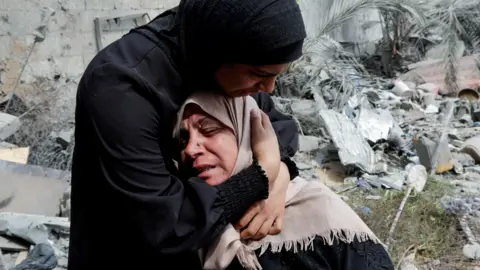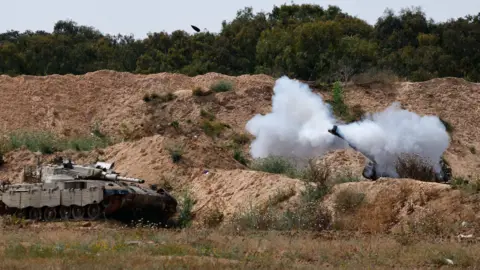Hamas says Gaza talks pointless while Israel continues 'starvation war'
 Reuters
ReutersA senior Hamas official has said the armed group is not interested in further talks on a new Gaza ceasefire and hostage release deal while Israel continues what he called its "starvation war".
Israel cut off all humanitarian aid from entering Gaza nine weeks ago and later resumed its military offensive, saying it was putting pressure on Hamas to release hostages.
But Bassem Naim said there was "no point in any negotiations" while the blockade remained in place.
His comments came after Israel's security cabinet approved an expanded offensive which could see the forced displacement of most of Gaza's 2.1 million population and occupation of all of the Palestinian territory indefinitely.
Israel also intends to replace the current aid delivery and distribution system with one channelled through private companies and military hubs.
The UN's humanitarian office has rejected that idea, saying it does not live up to fundamental humanitarian principles and "appears to be a deliberate attempt to weaponize the aid".
On Monday, the Israeli military's spokesman said its expanded ground offensive in Gaza would seek to bring home the remaining 59 hostages, up to 24 of whom are believed to be alive, and achieve the "dismantling and decisive defeat of the Hamas regime".
The operation would take place on a "wide scale" and involve "the movement of the majority of the Gaza Strip's population - in order to protect them in a Hamas-free zone", he added.
An Israeli official briefed the media that the offensive would also include "holding the territories, moving the Gazan population south for its defence, [and] denying Hamas the ability to distribute humanitarian supplies".
A second official said it would not be implemented until after US President Donald Trump's visit to the region next week, providing what he called "a window of opportunity" to Hamas to agree a new ceasefire and hostage release deal.
But Bassem Naim's comments on Tuesday seemed to counter that.
"There is no point in any negotiations or engagement with new proposals while [Israel] continues its starvation war against our people in the Gaza Strip - a war that the international community, including UN institutions, has deemed a war crime in itself," he said.
Hamas also put out a separate statement telling Israeli ministers that their approval of the expanded offensive represented "an explicit decision to sacrifice" Israeli hostages.
UN Secretary General António Guterres warned that expanded Israeli ground operations and a prolonged military presence would "inevitably lead to countless more civilians killed and the further destruction of Gaza".
France's Foreign Minister, Jean-Noël Barrot, said Israel's plans were "unacceptable" and that its government was "in violation of humanitarian law".
In Washington, Trump said the US would help supply food to people in Gaza, without going into details.
"People are starving and we're going to help them get some food," he said. "Hamas is making it impossible because they're taking everything that's brought in."
Israel cut off all deliveries of aid and other supplies on 2 March and resumed its offensive on 18 March after the collapse of a two-month ceasefire that saw 33 Israeli hostages released in exchange for about 1,900 Palestinian prisoners in Israeli jails.
Israel has also accused Hamas of stealing and storing aid - an allegation the group has denied.
But aid agencies have warned that mass starvation is imminent unless the blockade ends.
 Reuters
ReutersThe UN and its humanitarian partners have said Israeli authorities are seeking to shut down the existing aid distribution system run by them and are asking them to agree to deliver supplies "through Israeli hubs under conditions set by the Israeli military".
Israeli Army Radio reported on Tuesday that Israel was proposing to distribute aid from three distribution centres in the southern governorate of Rafah, which is currently covered by an Israeli evacuation order and cut off from the rest of the territory by a new military corridor.
It said a representative from each family in Gaza would be allowed to go to the centres to receive a week's supply of food - estimated to be about 70kg (154lb) on average - in order to prevent starvation. They would be screened to ensure Hamas members did not enter.
The report said the distribution would be managed by American organisations and private companies, rather than Israeli troops. It added that aid would not be distributed anywhere else in Gaza, which might hasten the movement of the population southwards.
A spokesman for the UN Office for Humanitarian Affairs (OCHA) said the Israeli plan "appears designed to further control and restrict supplies, which is the opposite of what is needed", adding that aid should never be used as a way of forcing populations to move.
Jens Laerke told a news conference in Geneva that the UN would not co-operate with the plan because it would "not live up to the core fundamental humanitarian principles of impartiality, neutrality, and independent delivery of aid".
"Impartiality means aid is provided on needs alone, not based on trying to get people to go somewhere," he said. "Then neutral and independent: it is extremely important that [those receiving aid] see a neutral provider that they have nothing to fear from."
The UN has said Israel is obliged under international law to ensure food and medical supplies for Gaza's population. Israel has said it is complying with international law and there is no aid shortage because thousands of lorry loads entered during the ceasefire.
One Palestinian man in Gaza said he believed Israel's proposal was "camouflage" and that it "has no intention of allowing aid into" the territory.
"This is the basic principle Israel is working on - to prolong the blockade until Gaza reaches an aggravated stage of famine," he told BBC Arabic's Gaza Today programme.
But another man said his "first and last concern" was receiving the supplies his family needed to survive, adding: "What really matters to us is that we want to live, eat, and go on with life."
The Israeli military launched a campaign to destroy Hamas in response to an unprecedented cross-border attack on 7 October 2023, in which about 1,200 people were killed and 251 others were taken hostage.
At least 52,615 people have been killed in Gaza since then, including 2,507 since the Israeli offensive resumed, according to the territory's Hamas-run health ministry.
Health officials reported that Israeli strikes killed at least 13 people across Gaza on Tuesday.
